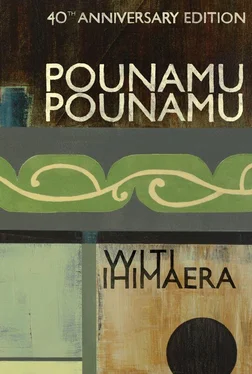And all the time, she would answer me in a vague voice, just like a little girl.
‘I don’ know, mokopuna. I don’ know where I put my kete. It’s somewhere. Somewhere here, somewhere.’
We’d play the game a little longer. Then I’d laugh.
‘Here it is, Nani! Here’s your bag!’
Her eyes would light up.
‘You found it, mokopuna? You found my kete? Ae, that’s it, that my kete.’
I would put it in her hands.
‘You ready to go now, Nani?’ I’d ask. ‘We go down to the sea now?’
‘I put my scarf on first, eh,’ she would answer. ‘Might be cold, might be makariri.’
Those other people, they never saw my Nani the way I did. And some of the kids at school they used to be funny to her. Willie Anderson, he would make faces and act all crazy. He would follow Nani and imitate the way she walked. His father caught him once, and gave him a good hiding. But Willie didn’t feel sorry; he only hated Nani more. And he told lies about her. We had a fight after school one day. He was tougher than me and he won. But I didn’t care, not even when he told some other kids I was porangi too.
I had my Nani; I didn’t need anybody else.
‘You fellas just leave my Nani alone,’ I told them. ‘Don’t you touch her even.’
Willie, he just laughed and threw dust at me.
But he was only jealous, because he’d thought that when Nani was staring in the sky, she was looking at nothing.
‘No! I’ve seen what she looks at, Willie Anderson, I’ve seen her world. She’s taken me there.’
Willie didn’t like that. He never liked being left out of things. That’s why he was jealous.
‘Come to me, Nani,’ I would say.
And she would come and lift her head so that I could put her scarf on her. She would sit very still and very silent, and her lips would move without saying anything. The words were soundless.
‘Yes, Nani,’ I would answer. ‘We’re going down to the sea soon. Just wait your hurry. No don’t say bad words to me. Nani! I heard what you said that time! You’re a bad girl!’
My Nani, she knew when I was angry with her. Her eyes would dim and she would fold her hands carefully in her lap. Sometimes, a small drop of spittle would trickle from her mouth.
‘I’m sorry, mokopuna,’ she would whisper slowly.
I’d wipe her lips.
‘Don’t cry, Nani. I was only playing. Don’t be a crybaby, don’t be a tangiweto!’
And her eyes would light up, and deep down in them I’d see a little girl beginning to smile.
‘You’re cunning all right, Nani!’ I would say. ‘Those are only pretending tears! I know you, Nani! So no more cry, eh? Come on, we go to the sea now. Haere mai.’
And she’d put her hand in mine.
My Nani, she used to be all right once. She never used to be porangi all the time. And she had another life, another history, way before I was born.
‘Your Nani was with Te Kooti the prophet when he took the people to Ohiwa,’ Dad told me. ‘She’s one of the morehu, the Ringatu survivors, of the Pakeha wars. During the 1918 flu epidemic she took all the children into the bush and didn’t bring us out until it was over. If it wasn’t for her we wouldn’t be here today. Over all these years she has protected and nurtured the seed sown at Raiatea.’
‘Where you going, Tawhai?’ Mum would ask.
And I would tell her, sometimes afraid that she might say, ‘No, you and Nani stay home.’
‘Me and Nani,’ I would answer, ‘we’re going down to the beach for a little walk. Won’t be long, Mum.’
‘Okay, but you look after Nani, eh. If it gets cold, you put your jersey around her. If it starts to rain, you bring her home straight away. And don’t get up to any mischief down there.’
‘All right, Mum.’
And I would turn to my Nani.
‘Come on, Nani. It’s all right. Mum said we could go. Come on, come to me, Nani. Give me your hand. Don’t be afraid.’
And together, we’d walk out of the house.
Sometimes, my Nani she’d be just like she used to be, as if she was waking up from a long moe. She’d laugh and talk and her body wouldn’t shiver all the time. But after a while, her mind would go to sleep again.
When she was asleep like that, I’d have to help her do things. Nani couldn’t even feed herself when her mind went away!
‘Come to me, Nani,’ I would say. And she’d sit down, and I’d put a tea towel around her neck to stop the kai from getting on her dress. ‘Open your mouth, Nani. Wider yet. That’s it. There we are! Wasn’t that good? This kai’s good eh!’ And she’d nod her head and make her moaning noises which meant she wanted some more. So I’d fill her spoon again, and she would smile to show she was happy.
‘What that thing?’ Nani would ask as we walked along the road.
And she would point to a house, a tree, a car or an animal grazing in a paddock. She liked pretending she didn’t know what things were.
‘That’s a horse, that’s a fowl, that’s where Mrs Katene lives, that’s a kowhai,’ I would tell her.
And she would repeat my words in a slow, sing-song voice.
‘A tree, a manuka, a fence, a horse. No, that’s not a horse, that’s a hoiho, mokopuna.’
‘That’s right, Nani!’ I would say. ‘You’re cleverer than me, eh! You know all the Maori names; I don’t, Nani. Your mokopuna, he’s dumb!’
And she would giggle and do a little dance. Sometimes, she’d even sing me a song.
Tahi nei taru kino
Mahi whaiaipo,
Kei te wehenga
Aroha kau ana.
And her quavering voice would lift its wings and circle softly in the air.
Nani liked to sing. Sometimes, she’d be waiting at the door for me when I got home from school, and she’d have the guitar in her hands. Kepa, my brother, he gave me that guitar and learned me a few chords. But I didn’t know how to play it properly. Nani didn’t mind, though. As long as I strummed it, she was happy. We’d sit on the verandah, she’d press my fingers to the strings, and as I played she would sing, one song after the other.
And sometimes, Dad would come and join us. ‘What a racket!’ he would say. ‘Here, give that guitar to me.’ And he would tune it and say to Nani, ‘Come on, Mum, we sing your song, eh? Ready, steady, go!’ My Dad, he could play that guitar! And him and Nani, they could sing as good as anything.
E puti puti koe, katoa hia
You’re just a flower from an old bouquet,
I’ve waited patiently for you, each day
That was Nani’s song. Her Pakeha name was Violet, and everybody called her that name because her Maori name was too long. And my Nani, she was just like a violet; shy and small and hiding her face in her petals if the sun blazed too strong.
‘We’re almost there now, eh, mokopuna,’ Nani would say.
And I would nod my head.
‘Ae, Nani. Almost there. Almost at the sea.’
Nani always said that same thing every time we reached the short cut to the beach. She’d hurry along the road to the gate. Beyond it, a path led through a paddock and down the cliff to where the sea was. Nani, she would run a little ahead of me, then look back just to make sure I was following. She didn’t like being alone.
‘Haere mai, mokopuna!’ she would yell. ‘Hurry up! The sea!’
And she would cock her head to the wind and hear the waves murmuring. Then she’d run along a little further and flutter her hands at me to hurry.
I used to pretend not to hear her, and just dawdle along.
‘Eh, Nani? What you say?’ I would call.
And always, she would flutter her hands and lean her head into the wind.
My Nani, she loved the sea. She and Nani Pita used to live in a house right on the beach. But when Nani Pita died, she came to live at our place because Dad was the eldest of her children. Dad, he told me that Nani wasn’t really porangi; just old and lonely. He didn’t know how long she’d stay with us because she was as old as Nani Pita.
Читать дальше












